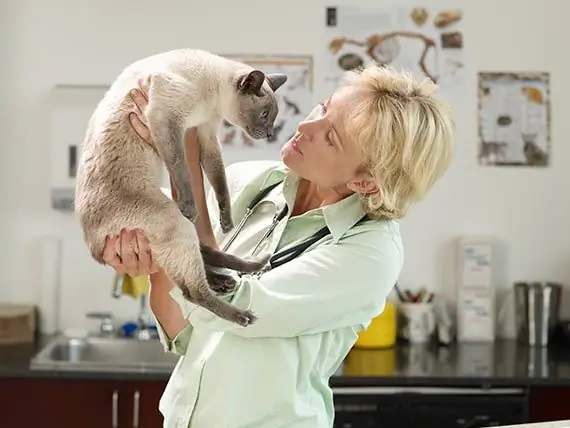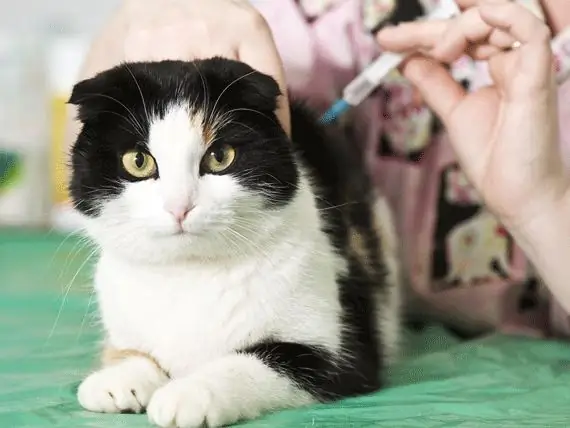
- Автор Daisy Haig haig@petsoundness.com.
- Public 2023-12-17 03:05.
- Последно модифициран 2025-06-01 06:47.
И така, за какво е този смущаващ тест за кака?
Достатъчно стресиращо е задната част на вашия домашен любимец да бъде нарушена от пластмасова пръчка, нали? И така, какъв е смисълът?
Вие казвате: Ако целта е да направя домашния си любимец по-здрав и без паразити, тогава ще се доверя на вашата преценка, но трябва да кажа, че проверките на изпражненията са вид жесток и необичаен вид наказание. Не получавам такъв вид унижения, докато не съм мъж и на четиридесет, нали? И фекалиите не са толкова полезни, нали?
Казвам: За начало не е необходимо домашният ви любимец да се поддава на мръсната пръчка. Прясна проба обикновено се получава лесно сутрин (или следобед) преди годишното ви посещение или по всяко време, когато вашият домашен любимец страда от стомашно-чревни симптоми. Не е толкова трудно, наистина. И ако времето не е точно точно (изпражненията не трябва да са по-стари от един час за най-добри резултати), вашата ветеринарна болница със сигурност няма да ви откаже правото да донесете супер прясна проба за ваше удобство. Обещайте.
И да, фекалните изследвания, макар и относително евтини и рутинни, са задължителни. Но както ще покаже тази публикация, също така е вярно, че не всички фекални тестове ще открият паразитна инфекция във вашите домашни любимци. Ето защо може да са необходими годишни и / или серийни фекални изследвания.
Сега за основната цел на теста:
Ветеринарните лекари винаги следят за паразити, които могат да попаднат в стомашно-чревния тракт на вашите домашни любимци. Разбира се, ние, хората, също можем да получим паразити, но нашият съвременен начин на живот обикновено е по-малко благоприятен за инфекция с паразити. (Кога за последно отидохте да се сдушвате на двора, с устни до земята, само за да можете да вдишате котешка трева или две?)
Да, домашните любимци получават много паразити. Ето извадка от най-често срещаните стомашно-чревни паразити, които виждам тук [в паразитното небе, което е полутропична Южна Флорида]:
Кръгли червеи при кучета и котки.
Анкилостоми при домашни любимци
Whipworms при домашни любимци
Жиардия при домашни любимци

Чернодробни метили при домашни любимци
Чернодробни метили при домашни любимци
coccidia in pets
i’ll not go into the gory details on each but you can click on the links and check out the info for a better understanding of how these parasites can potentially affect your pets and even your human family.
sure, pet-popular parasites don’t often infect humans in the so-called, “developed” nations all of you reading this likely live in, but that doesn’t mean it doesn’t happen. roundworms and hookworms are still a factor in humans in the us, as is giardia, which will give you the nastiest case of diarrhea you can imagine short of amoebic dysentery.
since veterinarians are also on the front lines when it comes to public health, consider that fecal exams are not just necessary for healthy pets, they’re essential for healthy humans, too, more so if your family members are very young children, very old adults or otherwise immunocompromised (transplant patients, hiv-positive humans, chemo recipients, etc.).
how do we identify these critters in the fecal exam?
the short answer: with a microscope.
the long answer: we take a tiny sample of your pet’s stool (very fresh is always best). a few grams is enough (think an eighth of a teaspoon if that’s easier). then we put it through one of three processes.
1. the smear: we take about a half gram of stool and smear it onto a microscope slide to search for parasites (and bacteria) directly. many times we’ll see them swimming about. finding evidence of parasites in a simple smear is often indicative of severe infection.
2. the float: this method relies on mixing the stool with a special solution. it filters out the big pieces of stool in a tube or other cylindrical vessel and allows the eggs and other small critters to float up to the top, buoyed by the solution’s specific gravity. a microscope slide’s cover slip is typically used to recover the floaters. some parasites, however, aren’t amenable to flotation. eggs seem to do best through this method.
3. centrifugation: spinning the heck out of stool in a centrifuge when it’s mixed in a sugar solution picks up about 50% more parasite eggs and oocysts than through flotation. therefore, i like this method best for worm eggs, giardia, and coccidia--though i’d never go without a smear. problem is, most hospitals don’t yet use this method. it’s more expensive than others and research demonstrating it’s much greater efficacy is fairly recent.
so now you know the truth: not all fecal exams are created equal. not only does this test rely on careful selection of materials and methods, it also requires a trained eye. in our practice, for example, one of our techs detects parasites about 50% more often than the veterinarians and other techs/assistants. (that’s why we also do floats so that she can check them all at her convenience when she comes back from her day off.)
it’s also true that even a parasite-infected animal will often not come up positive on a fecal test. human error and equipment choice are factors, but so is the parasite itself. sometimes they do not make themselves known in the stool. worms sometimes aren’t shedding their eggs and subclinical (low-grade or smoldering) infections may not reveal much, either.
again, that’s why it’s important to perform this test as often as is reasonable. for all dogs and cats at least three times during the first few months of life. i want to see at least two negative tests in a row, a month apart, before i’ll feel comfortable that my patient is parasite-free.
for adults, once a year is great--that is, unless they show gastrointestinal illnesses. in this case, serial fecal tests make sense--or at least one every time the symptoms recur until a definitive diagnosis is made (whether it’s parasites or something else).
ultimately, fecal tests are a critical component of our veterinary hat of tricks. doing without may seem like the economically wisest thing in the absence of gastrointestinal symptoms, but consider: parasites can wear pets down in ways you might not expect. and it’s never wrong to be too safe in the presence of diseases that may also affect your family. ‘nuff said.
Препоръчано:
Зад кулисите: Какъв е овърнайт посещението на ветеринарен лекар на вашия домашен любимец

Когато вашият домашен любимец трябва да прекара нощта в болницата за животни, може да бъде трудно както за вас, така и за животното. Ето какво могат да очакват собствениците от посещението на ветеринарен лекар за една нощ
Как прогнозата на вашия домашен любимец се определя от вашия ветеринарен лекар

„Когато се фокусираме твърде много върху конкретни прогностични фактори, ние изпускаме от поглед по-общата картина.“Преди да направи препоръки относно грижите за своите пациенти, д-р Intile се фокусира върху това да си спомни, че всяко животно е уникално създаден организъм и че много фактори трябва да бъдат претеглени. Научете повече за „прогностичните фактори“на вашия домашен любимец и как те определят лечението в днешния Daily Vet
Бихте ли се доверили на здравето на вашия домашен любимец на асистента на вашия ветеринар?

Бихте ли доверили здравето на вашия домашен любимец на асистента на вашия ветеринарен лекар? Добавянето на „средно ниво“на ветеринарни грижи, подобно на асистента на лекар по хуманна медицина, може да спести време и пари за потребителите и да направи ветеринарните грижи за недостатъчно географски райони по-възможни. Прочетете още
Какво Bloodwork казва на вашия ветеринар за здравето на вашия домашен любимец

Кръвните изследвания се извършват, за да се гарантира, че сме здрави отвътре, както изглеждаме отвън, или за да наблюдаваме предварително диагностицирани медицински състояния. Същото важи и за домашните животни. Научете повече за това какво кръвоизливи може да каже на вашия ветеринар
Успокояване на вашия домашен любимец след операция: какъв е вашият подход?

Винаги ли сте се чудили какво е необходимо, за да запазите домашния любимец в безопасност след операцията? В някои случаи е просто, когато спокойно животно може лесно да бъде оставено в удобна щайга за дълги разтягания наведнъж. Не, не е идеално, но е справедливо. В края на краищата домашните любимци се нуждаят от шанс да се излекуват и повечето няма да се съобразят без физически ограничения върху тяхното често увреждащо поведение. & Nbsp
